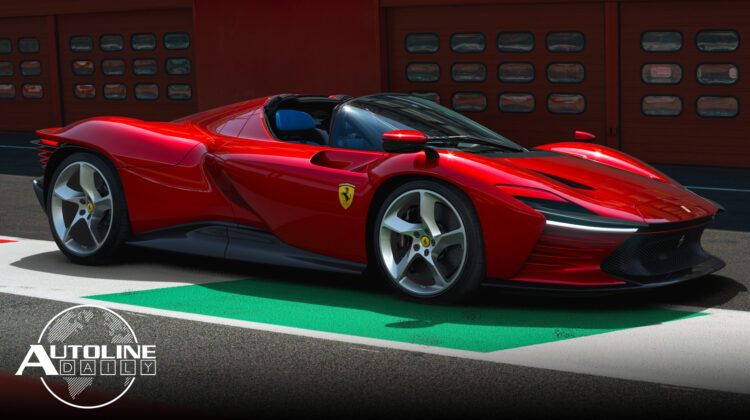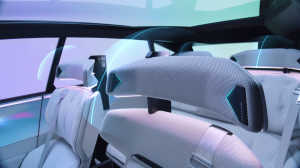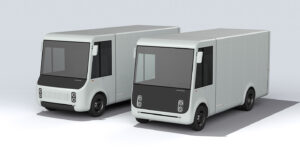
Listen to “AD #3348 – Ferrari Says No to Autonomous Vehicles; GM Preps for EV Launch In EU; Porsche Nailed for Cheating on Emissions” on Spreaker.
Follow us on social media:
Runtime: 9:22
0:08 Gasoline Is $6.76 In Canada
0:38 GM Preps for EV Launch In EU
1:27 Car Thieves Steal Right Off the Assembly Line
2:54 Ferrari Says No AVs, Not Never
3:50 Renault Re-Thinks Sound Inside EVs…
4:45 …And Hardens Them from Cyber Attacks
6:00 Porsche Nailed for Cheating on Emissions
6:39 New Electric Commercial Van Startup
7:41 Study Finds Quarter of EV Chargers Don’t Work
Visit our sponsors to thank them for their support of Autoline Daily: Bridgestone, Intrepid Control Systems, MEDC and Schaeffler.
This is Autoline Daily, the show dedicated to enthusiasts of the global automotive industry.
GASOLINE IS $6.76 IN CANADA
Americans are horrified that the average price of gasoline is over $5 a gallon. But Canadians have it worse. The average price in Canada is $6.76. You may have seen some reports that Canadians are paying $9 a gallon, but you have to remember that’s in Canadian dollars. If you want to pay in Loonies, the average price is $8.72. But no matter how you state it, that’s still a lot of pain at the pump.
GM PREPS FOR EV LAUNCH IN EU
General Motors pretty much dropped out of the European market when it sold off Opel and Vauxhall to what was then the Peugeot Group and what is now Stellantis. GM continued to sell some vehicles in low volume there, like Camaros, Corvettes and Escalades, but now it’s studying how to make a full return, and this time only with electric vehicles. It may even launch a robotaxi service with the Cruise Origin. And that’s got us thinking that GM may want to use a direct sales model so that it doesn’t have to rebuild a dealer network across Europe. After all, Ford’s CEO Jim Farley says a direct sales model can save anywhere from $2,000 to $3,000 per car. And that would offset a lot of the cost of any import duties.
CAR THIEVES STEAL RIGHT OFF THE ASSEMBLY LINE
Car thieves in Michigan are getting really bold. They’re stealing high performance vehicles right from assembly plants and marshaling yards. They’ve stolen Camaros from GM’s plant in Lansing, Mustang GT 350s from Ford’s Flat Rock assembly plant, Jeep Grand Cherokee Trackhawks from Stellantis’s plant in Detroit and Ford F-150 Raptors from Ford’s plant in Dearborn. And it isn’t that hard to do. When vehicles are driven off the assembly line and into the marshaling yards, the keys are left inside them. Somehow thieves are able to sneak into the yard and drive off, even if they have to smash through the gates on their way out. In many cases the vehicles are stuffed into shipping containers within hours of being stolen and sent to foreign markets.
FERRARI SAYS NO AVs, NOT NEVER
The late Sergio Marchionne, former CEO of FCA and Ferrari, once told us that Ferrari would never make an electric car. Well, that was then. Today, Ferrari is gung-ho on making electric cars. But now its new CEO, Benedetto Vigna, is making another NEVER statement. He says Ferrari will never have a self-driving vehicle. And by that he means Level 4 or 5 autonomy, though Ferrari will continue to develop ADAS safety features. But I believe what Vigna is saying. Bloomberg reports the company hosted some AI experts who wanted to pitch why Ferrari should adopt the technology, instead Vigna had them ride with a test driver in one of its cars. When they got back he claims they said “… OK Benedetto, our presentation is useless.”
RENAULT RE-THINKS SOUND INSIDE EVs…
With the EV revolution well under way, Renault says now is the time to rethink sound systems for vehicles, both inside and outside. On the inside, Renault is going for a less-is-more philosophy and will design audio systems using as few components as possible. It highlights its Scenic Vision concept, which only has a speaker in each door and ones in the headrests or what it calls ‘sound bubbles,’ where each passenger can hear audio that others in the car cannot. Renault’s future electric vehicles will also incorporate a new feature, called ‘sonic road.’ It takes data gathered by the vehicle, like location, the type of landscape, weather and even time of day, to recommend the ideal soundtrack for that drive. It’s all about making the experience more immersive for the passengers.
…AND HARDENS THEM FROM CYBER ATTACKS
But as vehicles become more connected, Renault is also focusing on cybersecurity. So, it developed an artificial intelligence and machine learning system that’s able to detect hacking attempts, analyze them and provide a response that protects the vehicle. This may sound like some way-off technology, but it will be incorporated in Renault vehicles starting in 2025.
PORSCHE NAILED FOR CHEATING ON EMISSIONS
Porsche went through some very special engineering to fool the EPA about the emissions and fuel economy its car’s get. It allegedly changed gear ratios and manipulated the software of test vehicles to boost fuel economy by 1 to 2 miles per gallon. Porsche owners got wind of the cheating and sued the company and won. Porsche is paying $80 million to settle the lawsuit, which involves half a million Porsches built between 2005 and 2020. And it sure is disheartening to see the length some car companies will go to cheat their way to victory.
NEW COMMERCIAL ELECTRIC VAN STARTUP
The electric commercial van segment is about to get more crowded. Here’s a new EV startup we ran across called FOUR8 Commercial that’s based in the UK. The vans feature a lightweight frame and composite structure to reduce weight and carbon emissions during manufacturing and operation. Compared to ICE vans, FOUR8 says its vehicles use 50% less energy over their lifecycle. The vans are modular and available in short, medium and long wheelbases and the body panels are mechanically fixed to the frame instead of being welded, which makes them easier to repair. The interior is also modularly designed and can easily be configured for right- or left-hand drive. In addition to a pure electric, there are ICE, hybrid, CNG and hydrogen powered versions. In the future FOUR8 plans to make other variants including a shuttle, bus, pickup or food service vans.
STUDY FINDS QUARTER OF EV CHARGERS DON’T WORK
A new study from the University of California Berkeley found that more than a quarter of public chargers in the Bay Area weren’t working properly. It tested 678 chargers at 181 stations and only 72.5% were functional. The others had unresponsive or unavailable screens, payment system failures, charge initiation failures, network failures or broken connecters. And there were even some that didn’t have long enough cables to reach the charging port on the vehicle. The study did not include Tesla Superchargers because it isn’t considered public but a previous study found that only 4% of Tesla owners reported an issue with charging.
But that brings us to the end of today’s show and this week. I hope you have a great weekend. And to all the dads out there, Happy Father’s Day!
Thanks to our partner for embedding Autoline Daily on its website: WardsAuto.com
Seamus and Sean McElroy cover the latest news in the automotive industry for Autoline Daily.








